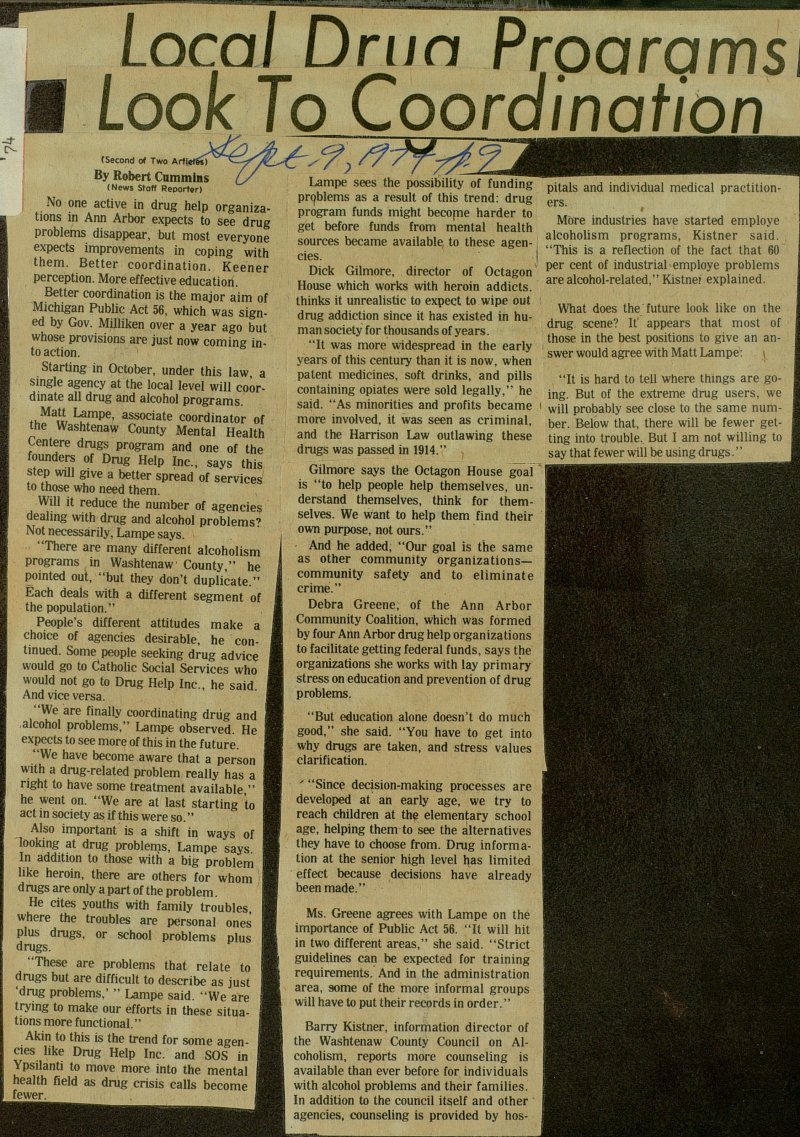Local Drug Programs Look To Coordination

(Second of Two ArtWSs) No one active in drug help organizations in Ann Arbor expects to see drug problems disappear, but most everyone expects improvements in coping with them. Better coordination. Keener perception. More effective educatiori. Better coordination is the major aim of Michigan Public Act 56, which was signed by Gov. Milliken over a year ago but whose provisions are just now coming into action. Starting in October, under this law a single agency at the local level will coordínate all drug and alcohol programs. thf mpe associate coördinator of the Washtenaw County Mental Health Centere drugs program and one of the founders of Drug Help Inc., says this step will give a better spread of services to those who need them. Will it reduce the number of agencies dealing with drug and alcohol problems? Not necessárily, Lampe says. "There are many different alcoholism programs in Washtenaw County " he pointed out, "but they don't duplícate." Each deals with a different segment of the population." People's different attitudes make a choice of agencies desirable, he continued. Some people seeking drug advice I would go to Catholic Social Services who would not go to Drug Help Inc., he said I And vice versa. 1 "We are finally coordinating drug and alcohol problems," Lampe observed. He expects to see more of this in the future. "We have become aware that a person with a drug-related problem really has a right to have some treatment available," he went on. "We are at last starting to act in society as if this were so." Also important is a shift in ways of looking at drug problems, Lampe says In addition to those with a big problem like heroin, there are others for whom d rugs are only a part of the problem . He cites youths with family troubles where the troubles are personal ones plus drugs, or school problems plus drugs. "These are problems that relate to drugs but are difficult to describe as just 'drug problems,' " Lampe said. "We are trying to make our efforts in these situations more functional." Akin to this is the trend for some agencies like Drug Help Inc. and SOS in Ypsilanti to move more into the mental health field as drug crisis calis become fewer. Lampe sees the possibility of funding problems as a result of this trend: drug program funds might become harder to get before funds from mental health sources became available, to these agencies. Dick Gilmore, director of Octagon House which works with heroin addicts, thinks it unrealistic to expect to wipe out drug addiction since it has existed in human society for thousands of years. "It was more widespread in the early years of this century than it is now, when patent medicines, soft drinks, and pills containing opiates were sold legally," he said. "As minorities and profits became more involved, it was seen as criminal, and the Harrison Law outlawing these drugs was passed in 1914." , Gilmore says the Octagon House goai is "to help people help themselves, understand themselves, think for themselves. We want to help them find their own purpose, not ours." And he added, "Our goal is the same as other community organizations- community safety and to elimínate crime." Debra Greene, of the Ann Arbor Community Coalition, which was formed by four Ann Arbor drug help organizations to facilítate getting federal funds, says the organizations she works with lay primary stress on education and prevention of drug problems. "But education alone doesn't do much good," she said. "You have to get into why drugs are taken, and stress values clarification. ' "Since decision-making processes are developed at an early age, we try to reach children at the elementary school age, helping them to see the alternatives they have to choose from. Drug information at the senior high level has limited effect because decisions have already been made." Ms. Greene agrees with Lampe on the importance of Public Act 56. "It will hit in two different areas," she said. "Strict guidelines can be expected for training requirements. And in the administration area, some of the more informal groups will have to put their records in order." Barry Kistner, information director of the Washtenaw County Council on Alcoholism, reports more counseling is available than ever before for individu als with alcohol problems and their families. In addition to the council itself and other agencies, counseling is provided by pitáis and individual medical praetitioners. More industries have started employé alcoholism programs, Kistner said. "This is a reflection of the fact that 60 per cent of industrial employé problems arealcohol-related," Kistner explained. What does the future look like on the drug scène? It' appears that most of those in the best positions to give an answer would agree with Matt Lampe: "It is hard to teil where things are going. But of the extreme drug users, we will probably see close to the same number. Below that, there will be fewer getting into trouble. But I am not willing to say that fewer will be using drugs . ' '
Article
Subjects
Robert Cummins
Washtenaw County Council on Alcoholism
Washtenaw County Community Mental Health Center
Octagon House
Laws & Legislation
Drugs
Drug Help Inc.
Catholic Social Services of Washtenaw County
Ann Arbor Community Coalition
Alcoholism
Addiction Services
Ann Arbor News
Old News
Richard Paul Gilmore
Matt Lampe
Gov. William G. Milliken
Debra Greene
Barry Kistner